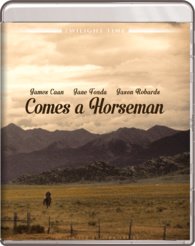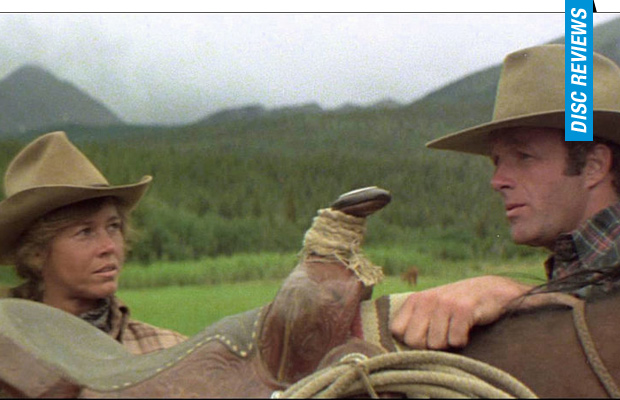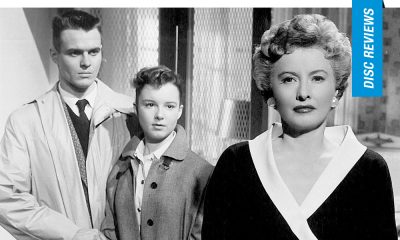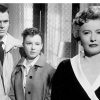Reviews
Comes a Horseman | Blu-ray Review
 Of the noted revisionist westerns from the New American Cinema of the 1970s, one of the most neglected is Alan J. Pakula’s 1978 title Comes a Horseman. If Pakula’s cinematic peers were either purposefully (Altman, Eastwood) or accidentally (Penn) contributing to a mutation of the English language’s most rugged, indubitably virile genre, none of them were taking the gauntlet from the likes of Anthony Mann or Nicholas Ray and their subversive feminine perspective westerns as forcibly as this title does. A successor to spaces inhabited by the like of Barbara Stanwyck and Joan Crawford, a resilient Jane Fonda is one of several assets making this late 70s gem worthy of recuperation in a narrative simmering with sexual tension and outbursts of extreme aggression thanks to the disturbing ill-will of its sleazy antagonist played marvelously by Jason Robards.
Of the noted revisionist westerns from the New American Cinema of the 1970s, one of the most neglected is Alan J. Pakula’s 1978 title Comes a Horseman. If Pakula’s cinematic peers were either purposefully (Altman, Eastwood) or accidentally (Penn) contributing to a mutation of the English language’s most rugged, indubitably virile genre, none of them were taking the gauntlet from the likes of Anthony Mann or Nicholas Ray and their subversive feminine perspective westerns as forcibly as this title does. A successor to spaces inhabited by the like of Barbara Stanwyck and Joan Crawford, a resilient Jane Fonda is one of several assets making this late 70s gem worthy of recuperation in a narrative simmering with sexual tension and outbursts of extreme aggression thanks to the disturbing ill-will of its sleazy antagonist played marvelously by Jason Robards.
After the death of her father, Ella Connor (Fonda) is left alone on her failing cattle ranch, her only assistance in the form of the gone-to-seed Dodger (Richard Farnsworth). Pressured by the ruthless land baron J.W. Ewing (Jason Robards), her father’s fierce competitor and ex-lover, all seems lost for the single woman when providence arrives in the form of Buck Athearn (James Caan), a neighbor who is wronged by Ewing and commits to joining forces with Ella in order to keep her ranch from going under.
Comes a Horseman, for all its superficial simplicities, is a Western of notable stock (in oater lingo, one might say it’s a product of good breeding). It’s the only theatrical feature ever written by Dennis Lynton Clark, previously known for his credits as a production designer on a pair of early 70s Richard Harris Westerns, including A Man Called Horse (1970) and Man in the Wilderness (1971), a film which beat 2015’s The Revenant to the punch for its portrayal of the same mythic pioneer.
Arguably, there’s not much extraordinary about the narrative of Comes a Horseman beyond its distinctive setting, in the final days of WWII, when ranchers once dependent upon their livestock being bought up for the war effort are now forced into early retirement or snuffed out of business by more aggressive competitors with more resources. But Clark gives Jane Fonda’s Ella more Freudian daddy issues than Barbara Stanwyck in Anthony Mann’s masterpiece The Furies (1950), a woman who slept with her father’s dreadful rival, to become a woman rather poetically described in a monologue as having been “weaned on war,” compared to those abused horses known as ‘stargazers,’ their heads jerked so forcefully by their masters they become conditioned to leer skyward. And so James Caan, hypothetically, is this titular horseman who comes to save the day, the wild card Robards’ malicious J.W. Ewing is unable to predict.
Featuring Irwin Winkler as an executive producer, Comes a Horseman came along during Pakula’s mid-period, having unveiled a startling knack for offbeat dramas (beginning with the Liza Minnelli vehicle The Sterile Cuckoo, 1971) and sort of leveling off into troubled legal dramas after the harrowing Meryl Streep film Sophie’s Choice (1982). Comes a Horseman plays like a sobered up vagabond of a film, its characters struggling valiantly to overcome perilous odds after making significant mistakes. There’s rarely a sequence (with the exception of a community dance) where Fonda’s character isn’t steeled against the elements, forever on guard from the wolfish Robards, here a formidable villain, the actor fresh off a pair of Best Supporting Oscar wins, one for Pakula’s All the President’s Men, and the other for Julia, which also starred Fonda.
The film was notably the first notable role for stunt man Richard Farnsworth, the only player to get any Oscar love, picking up a Best Supporting Actor nod the handy old codger, Dodger. The second of three productions Pakula would collaborate on with Fonda (the others being Klute, for which she won her first Oscar, and 1981’s less celebrated Rollover), lead James Caan walks away as the least significant aspect, despite giving a likeable performance (and granted a typical but enjoyable fisticuffs sequence at the local dive bar), the second offbeat Western he would take part in (the other being Claude Lelouch’s Another Man, Another Chance the year prior).
DP Gordon Willis captures some beautiful landscape sequences in this rancher empire, which hinges on the dawn of a new era as bankers come sniffing for oil beneath the rolling vert plains. Ella’s declination to let them drill on her land leads to a devious plot for them to test from Ewing’s land by drilling sideways, ‘penetrating’ her land against her will and without her knowledge. If the third act lurches heavily, and unexpectedly into blunt violence, it’s of little consequence considering the masterful production and notable characterizations of this offbeat, melancholy Western of changing times and changing ideals.
Disc Review:
Twilight Time releases their limited edition (3,000 units) in 2.35:1 with 1.0 DTS-HD master audio. It’s a fitting transfer for Gordon Willis’ beautiful cinematography, an underrated gem from the DP due to his work on Coppola’s The Godfather films and several Woody Allen classics (this arrived between the trio of Annie Hall/Interiors/Manhattan). Composer Michael Small’s score is included as an isolated track (often the most hopeful and upbeat element here).
Final Thoughts:
A formidably staged Western melodrama, lovers of the New American Cinema should rejoice at one of Pakula’s many neglected masterpieces arriving in pristine new packaging.
Film Review: ★★★★/☆☆☆☆☆
Disc Review: ★★★★/☆☆☆☆☆
Los Angeles based Nicholas Bell is IONCINEMA.com's Chief Film Critic and covers film festivals such as Sundance, Berlin, Cannes and TIFF. He is part of the critic groups on Rotten Tomatoes, The Los Angeles Film Critics Association (LAFCA), the Online Film Critics Society (OFCS) and GALECA. His top 3 for 2021: France (Bruno Dumont), Passing (Rebecca Hall) and Nightmare Alley (Guillermo Del Toro). He was a jury member at the 2019 Cleveland International Film Festival.
































